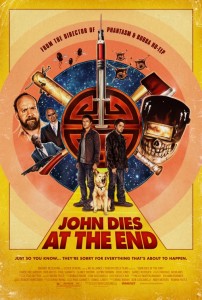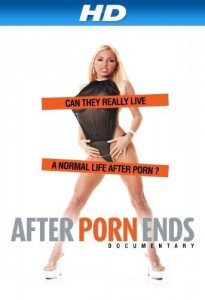John Dies at the End

Plot: Dave Wong (Chase Williamson) is regaling his insane tale of time travel through other dimensions with his buddy, John Cheese (Rob Mayes) to Arnie Blondestone (Paul Giamatti), a journalist. The story may sound like a work of fiction, especially since it’s all done under the influence of a new street drug, but it may be closer to truth than it appears.
Review: Don Coscarelli was the perfect choice to adapt the strange novel into a film. He’s had experience with outlandish films in the past, his most notorious being “Phantasm” and “Bubba Ho-Tep”. He knows how to handle the bizarre without being obnoxious about it. Had somebody like Joseph Kahn directed this, it would’ve been a cluttered mess of stupidity. With Coscarelli, it’s an orgasmic mix of the surreal!
What makes the strange activities in “John Dies at the End” easy to swallow is it’s uncertainty. Who’s to say the crazy events in this film actually take place? It’s hard to believe that Dave and John can travel through different dimensions and encounter the likes of meat monsters, telepathic dogs, aliens, unnamable creatures and invisible bugs. Once we learn it’s all possible after taking a street drug entitled Soy Sauce, it’s easy to write it off as vivid hallucinations. That could be the entire message of the story. An allegory on how drugs mess with the mind and lead to your possible death.
There’s a monkey wrench thrown in, though. Early in the film, Dave receives a call from John… when he’s sitting right across the table from him. The John across the table isn’t on a phone and the one that is warns Dave to avoid him. Dave hasn’t taken the Soy Sauce yet, so this has to be happening for real. Granted, we see this in a flashback that’s being told to Arnie, so it could be made up and/or the original scenario has been altered by the side effects of the drug.
Even then, there’s a reveal near the end revolving around Arnie that damages the theory that this is all a hallucination. The film ends on an equivocation, which will certainly anger some viewers. Most will want everything to be resolved by the end, which it technically is. The only thing that isn’t is if the previous occurrences were fact or fiction. Were we taken on an acid trip of our own or did what we just see actually happen in this film’s reality?
The beauty of “John Dies at the End” is that it’s allegory (or lack thereof) doesn’t really matter. It’s all about to our own perception. Which could also be an allegory on how our minds work on drugs. If all of this confuses you, don’t fret. You can simply sit back and enjoy the psychotic ride!
Final Rating: A
The Imposter

Plot: A documentary focusing on a young Frenchman who takes the identity of a missing 16-year-old boy in San Antonio, Texas.
Review: All I’m going to tell you about “The Imposter” is what has been described in the plot synopsis. I feel this is a film that is best served going into cold. The less you know about the case, the better. Bart Layton is a master documentarian because he knows how to tell a story! He knows how to meticulously give the audience details and when to do so. He never gives us all of the information up front. He lets it slowly seep out, just like it did for those involved.
I was worried about writing this review, as I didn’t want to give anything away about the film. Even typing the plot synopsis had me worried. Was I giving too much away? Not at all. Knowing that this is a documentary about an imposter (which you all figured out by now anyway) who uses the identity of a 16-year-old isn’t too revealing. It’s not even the shocking part. It’s how everything unfolds from thereon out that is captivating!
“The Imposter” sent chills up my spine! The hairs on my neck stood up. My mind felt as if it had been tricked. As if this was all a clever parlor trick. The fact of the matter is that this is all true. There are interviews with the people involved and archival footage to back it up. Yes, there are reenactments, but they’re done so professionally and subtlety that they don’t take you out of it. They further enhance the experience!
There’s nothing more I can say about “The Imposter” without either giving it away or sounding like a thesaurus. All you need to know is that you need to see this film! I don’t care if you don’t like documentaries. If you find them boring, this will have the opposite effect on you. See this movie! Now!
Final Rating: A+
The Loneliest Planet

Plot: Nica (Hani Furstenberg) and Alex (Gael García Bernal) are an engaged couple backpacking through the Caucasus Mountains. What starts out as an innocent trek with their tour guide, Dato (Bidzina Gujabidze), turns fatal for their relationship after a single misstep.
Review: Take the cinematography of “Meek’s Cutoff” and the tone of “Somewhere” and you’d get “The Loneliest Planet”. Julia Loktev films in real time, the same method Sofia Coppola used in the latter film. It’s a method of mirroring how events would play out in the real world. That means a slow pace and dragged out scenes. Essentially, the editing department gets to take it a bit easier. That’s not the reason it’s implemented. It’s to develop the characters and show just how quickly one timely mistake can alter everything.
While this works from a critical standpoint, there are two factors that damage it. The first being that the slow pacing can turn the viewer off. There’s only so much of aimless walking one can take. This where the cinematography of Inti Briones comes into play, helping alleviate some of the doldrums. I’d relate it to Christopher Blauvelt’s work in “Meek’s Cutoff”, where a keen eye for huge landscapes aids in capturing beautiful imagery! These are the men you hire to film exquisite nature documentaries. Putting them to work on films such as this (which greatly benefit from the cinematography) is a wise decision!
Gorgeous cinematography can only take you so far. Terence Malick’s “Tree of Life” didn’t work solely because of it’s lavish cinematography. The story and characters were captivating and led to a satisfying finale. While the characters of Nica and Alex are interesting and likable, we don’t get as much depth as one would like to fully feel comfortable with them. Credit goes to the actors for carrying this burden and using their dialogue and mannerisms to develop some characteristics.
What hurts them is that the misstep made isn’t satisfying enough for the long trek there. Sure, it’s devastating and will take a huge toll on their relationship. However, it doesn’t feel like enough of a payoff for the hour and fifty-three minute runtime. You keep waiting and waiting for something pivotal to happen and when it does, it feels like a blank being shot. You don’t get the full impact of a bullet that this film so desperately needed.
I’d still recommend checking “The Loneliest Planet” out. While the pacing can be a struggle at times, Loktev does put the couple into precarious situations (most involving nature). It’s not a dreadful bore like “Somewhere”. Being held up at gunpoint is more riveting than watching Elle Fanning and Chris Pontius play Wii Tennis. It also brings forth better cinematography! That may not be the best praise Loktev wanted, but that’s what I’m settling on.
Final Rating: B-
After Porn Ends

Plot: Bryce Wagoner’s documentary takes a look at porn stars and their life after their careers end.
Review: I applaud Bryce Wagoner for presenting porn stars as actual human beings! Anybody could’ve made this documentary and viewed the actors as emotionless pawns that most of society does. He even touches upon this with most interview personalities, with an offer of a sex book stating that eighty percent of people define porn stars as scum. This isn’t shocking, but is disheartening to the people involved.
By treating the porn stars as human beings, Bryce makes the audience feel comfortable with them and look past their job status. It’s kind of ironic that their livelihood is in turning viewers on sexually without actually creating an emotional bond, yet this documentary actually made me care about the people themselves. I wasn’t jotting down the titles of their films as they flashed on the screen. Instead, I embraced who these people were and simply wanted to get to know them.
While the film is called “After Porn Ends”, Wagoner spends a good chunk of time discussing stars’ life before porn and their stories in the business. This is a good practice to familiarize the audience with who these people are and why they got into the business. It’s not a surprise that most of them were abused and/or bullied when they were young, seeking this business for the attention and adulation (albeit brief). Others simply fell into it, most of the women because of their modeling careers.
Wagoner does spend too much time deciphering their past (both before porn and in it), somewhat negating the ‘After’ in the title. I would’ve liked to have seen more time devoted to the stars’ current careers. One is a bounty hunter, yet we only get one story about her job. Surely there are dozens more to tell! Another became a born-again Christian, but she only briefly touches on how those in her community handle it. At least Asia Carrera doesn’t have to encounter that often since she moved to Utah, where porn is banned. That was a fact I learned in this documentary and it guaranteed that I would never move to Utah.
Wagoner may lose focus on what his documentary was supposed to be about, but he does so by humanizing porn stars. It’s a shame those who chastise the people involved in the industry won’t see this documentary out of spite, as they may have a different outlook on the performers. Granted, they’d also have more ammo for their arsenal, as not all past performers have good lives afterward. For every bad egg, there’s a Randy West or John Leslie, who lived happily (for the most part) in their fifties and onward.
Final Rating: B
Hello I Must Be Going

Plot: Amy Minsky (Melanie Lynskey) is a recently divorced woman who had to move back in with her parents, Ruth & Stan (Blythe Danner & John Rubinstein). While she wanders in a state of despair, a young actor by the name of Jeremy (Christopher Abbott) woos her and rejuvenates her passion for life.
Review: Melanie Lynskey’s performance in “Hello I Must Be Going” is phenomenal! She’s able to break the typecast of the crazy girl that “Two And A Half Men” bestowed upon her and play an emotionally crippled woman going through a mid-life crisis. One that was brought on by her ex-husband and is only exacerbated by her unruly mother. With little touches in her mannerisms (such as the pain in her eyes) and the sudden outbursts one goes through during depression, she perfectly conveys the toils of a failed marriage and garners much sympathy from the audience!
Too bad such a wonderful performance is stuck in such a humdrum film. It’s not that “Hello I Must Going” is bad. It’s fine for what it is. That being a cutesy tale of finding love in the most peculiar of places. The romance Amy has with Jeremy is clearly a rebound meant for her to have some much needed fun, though the nineteen year old takes it too seriously. They make out and swim naked and whisper sweet nothings into each other’s ears all to crack a smile from the crowd (which it admittedly does). Then they fight when their cover is almost blown and she unintentionally breaks his heart. It’d be a bit more convincing if the two had better chemistry, but they make do with what they’ve got.
When they’re not fawning over each other, they both deal with rudimentary problems. Amy butts heads with her unruly mother, who seems more concerned with her expensive decorative than her own daughter. She puts her down whenever she feels fit (at one point almost calling her a failure), causing her daughter to hide in her room and watch Marx Brothers films (which is where the title comes from). Her father comes in and consoles her, but even he struggles with the thought of his daughter not getting back on her feet, especially on the heels of his possible failure at work. Oh, and Jeremy argues with his mother who doesn’t understand him (despite being a therapist). She was once an actress, so she pushes him into the field regardless of whether or not he likes it. She even thinks he’s gay simply because that’s more pleasing for an actor nowadays.
It’s not that Todd Louiso’s direction is bad. It’s that he’s working off of a streamlined script (written by Sarah Koskoff). One that is more comfortable in treading over familiar territory than it is in pushing boundaries. The elements are here for a much more dramatic and successful film. Nothing needs to be changed outside of the cutesy way everything is dealt out (especially with how each argument ends). Amy’s affair with a nineteen-year-old could’ve been a catapult to dissect her current woes. Instead, it plays out more like a sugary love story. That’s okay, but not enough.
Final Rating: C+
